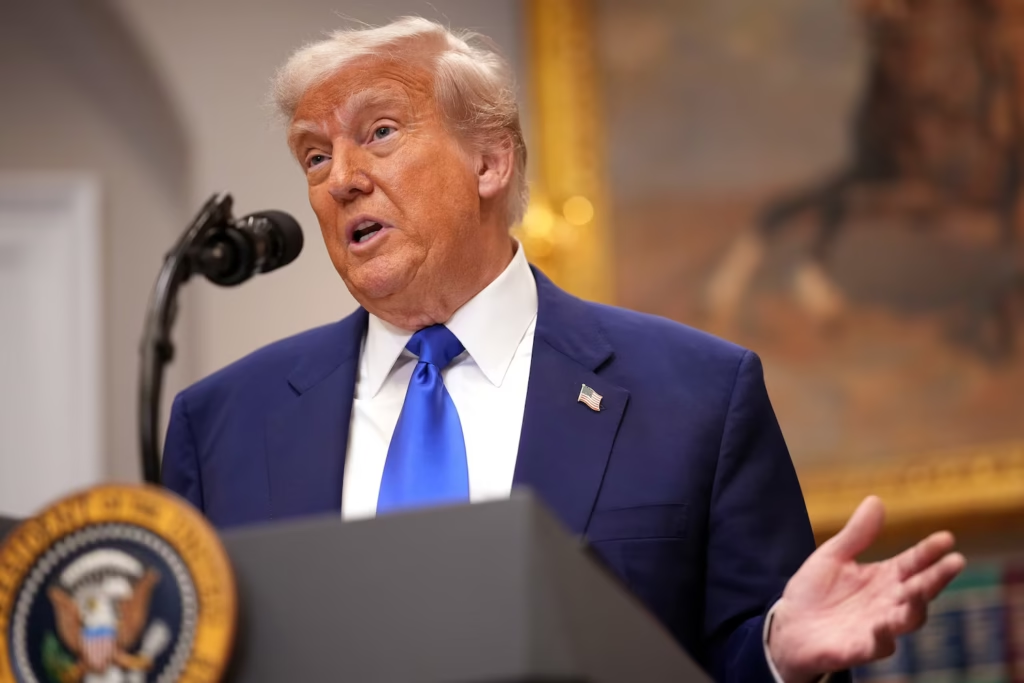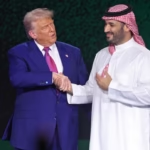During a recent appearance at a forum in Riyadh, Saudi Arabia, former President Donald Trump delivered a stern message regarding the United States’ stance on defense, promising to protect its allies and emphasize the military strength of the nation. Speaking with authority, Trump made it clear that the United States would not hesitate to use its military power when necessary, particularly when defending American interests or its global partners. His words came as part of a broader speech in which he highlighted the unparalleled strength of the U.S. military, stressing that no adversary should underestimate the country’s resolve.
Trump’s vow to defend the United States and its allies was punctuated by a strong declaration: “I will never hesitate to wield American power if it’s necessary to defend the United States or to help defend our allies. And there will be no mercy for any foe who tries to do us or them harm. We will have no mercy.” The boldness of his statement underscored the former president’s stance on the use of military force, reinforcing the idea that the U.S. would act decisively and without hesitation in the face of threats. This sentiment comes at a time when the global landscape is fraught with tensions, and many are looking to the United States for leadership in maintaining security and stability.
Trump’s comments come against the backdrop of rising concerns about global security, particularly in the Middle East. The region has been a focal point of U.S. military presence for decades, and the country’s alliances with nations like Saudi Arabia, Israel, and other Gulf states have played a critical role in shaping American foreign policy. By reiterating his commitment to defend these allies, Trump sought to reassure them that the United States would remain a steadfast partner, even as global power dynamics shift.
“We don’t want to use them,” Trump added, referring to the military capabilities of the U.S. “If you threaten America or our partners, however, then you’ll be faced with overwhelming strength and devastating force.” His words were a stark warning to any potential adversary, emphasizing the U.S.’s commitment to using its “best weapons in the world” if the need arose. This message was not only a reaffirmation of America’s military capabilities but also a signal to both allies and adversaries alike that the U.S. would not shy away from utilizing its overwhelming military might if its interests or the security of its allies were at risk.
The speech was delivered at a time when the geopolitical landscape remains increasingly complex, with rising tensions in various parts of the world. In particular, the situation in the Middle East continues to be a source of concern, with ongoing conflicts in Syria, Yemen, and tensions between Iran and its regional adversaries. Trump’s strong language was aimed at reinforcing the idea that the U.S. would stand firm in the face of these challenges, ensuring that its allies would have the support they need to navigate these tumultuous times.
Trump’s rhetoric also served as a response to critics who have argued that the U.S. has become less committed to its traditional global leadership role. Under the administration of his successor, President Joe Biden, there has been a marked shift in U.S. foreign policy, with a greater emphasis on multilateralism and diplomatic engagement. Trump’s remarks, on the other hand, were firmly rooted in the belief that American strength, both military and economic, is the cornerstone of global stability. His approach to foreign policy was more unilateral, with a focus on “America First” and an emphasis on national sovereignty, often prioritizing direct action over international consensus.
The former president’s comments about using overwhelming military force were also an acknowledgment of the technological and strategic advancements that have made the U.S. military one of the most powerful in the world. Over the past few decades, the U.S. has developed and deployed some of the most advanced weaponry and defense systems, including cutting-edge fighter jets, naval vessels, missile defense systems, and cyber warfare capabilities. This technological superiority has been a key element of American foreign policy, allowing the U.S. to project power globally and maintain a presence in strategic regions.
However, while Trump’s rhetoric focused on military might, it also underscored the importance of the U.S. maintaining strong relationships with its allies. The partnerships the U.S. has with nations like Saudi Arabia, Israel, and other countries in the Gulf Cooperation Council (GCC) have been central to its strategic interests in the Middle East. These alliances have allowed the U.S. to counterbalance the influence of adversaries like Iran, and they have played a crucial role in ensuring the stability of the region’s oil supply and broader geopolitical stability.
During his speech, Trump emphasized that these alliances are mutually beneficial, with both the U.S. and its partners working together to ensure their shared interests are safeguarded. By focusing on the importance of these relationships, Trump sought to reaffirm the U.S.’s commitment to its allies, even as new challenges arise in the region. He also used the opportunity to highlight his administration’s policies, which were characterized by strong support for the Saudi leadership and a firm stance against Iran.
Critics of Trump’s foreign policy often pointed to his close relationship with Saudi Crown Prince Mohammed bin Salman (MBS), especially in the wake of the 2018 assassination of journalist Jamal Khashoggi. While many in the international community called for accountability and a reevaluation of U.S.-Saudi relations, Trump’s administration continued to prioritize the strategic partnership with the Kingdom. Trump’s remarks in Riyadh reflected this longstanding alignment, reinforcing the idea that the U.S. would continue to stand by Saudi Arabia, regardless of the controversies that have surrounded the kingdom’s leadership.
Trump’s focus on military power and support for allies also served as a direct contrast to his predecessor, President Biden, who has been more cautious in his approach to military interventions. Biden’s administration has sought to pivot away from the aggressive foreign policy stance that characterized Trump’s tenure, focusing instead on diplomacy and multilateral cooperation. However, Trump’s speech indicated that, under his leadership, the U.S. would be more inclined to take bold, decisive action when necessary to protect its interests and defend its allies.
The broader implications of Trump’s comments are likely to be felt beyond the Middle East. His reaffirmation of American military power and commitment to its allies sends a message to other global powers, including Russia and China, that the U.S. will not back down from defending its position on the world stage. In particular, Trump’s statements could be seen as a signal to China, as the U.S. has increasingly focused its attention on countering China’s growing influence in the Indo-Pacific region and its assertive stance in the South China Sea.
As global tensions rise and new challenges emerge, the U.S.’s approach to foreign policy and its military strategy will continue to evolve. Trump’s speech, with its emphasis on American strength, military power, and unwavering support for allies, serves as a reminder of the country’s pivotal role in shaping the future of global geopolitics. Whether or not he returns to the White House, Trump’s vision for America’s role in the world will undoubtedly continue to influence debates on U.S. foreign policy for years to come. His rhetoric in Riyadh serves as a potent reminder that, for Trump, the defense of American interests and the protection of its allies remain at the core of his foreign policy agenda.



